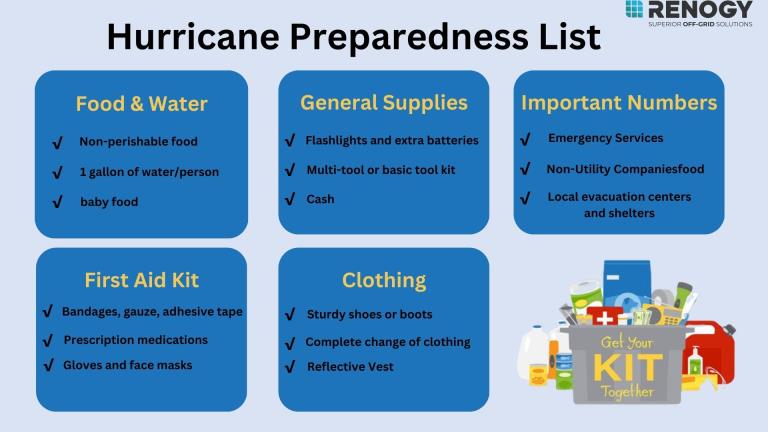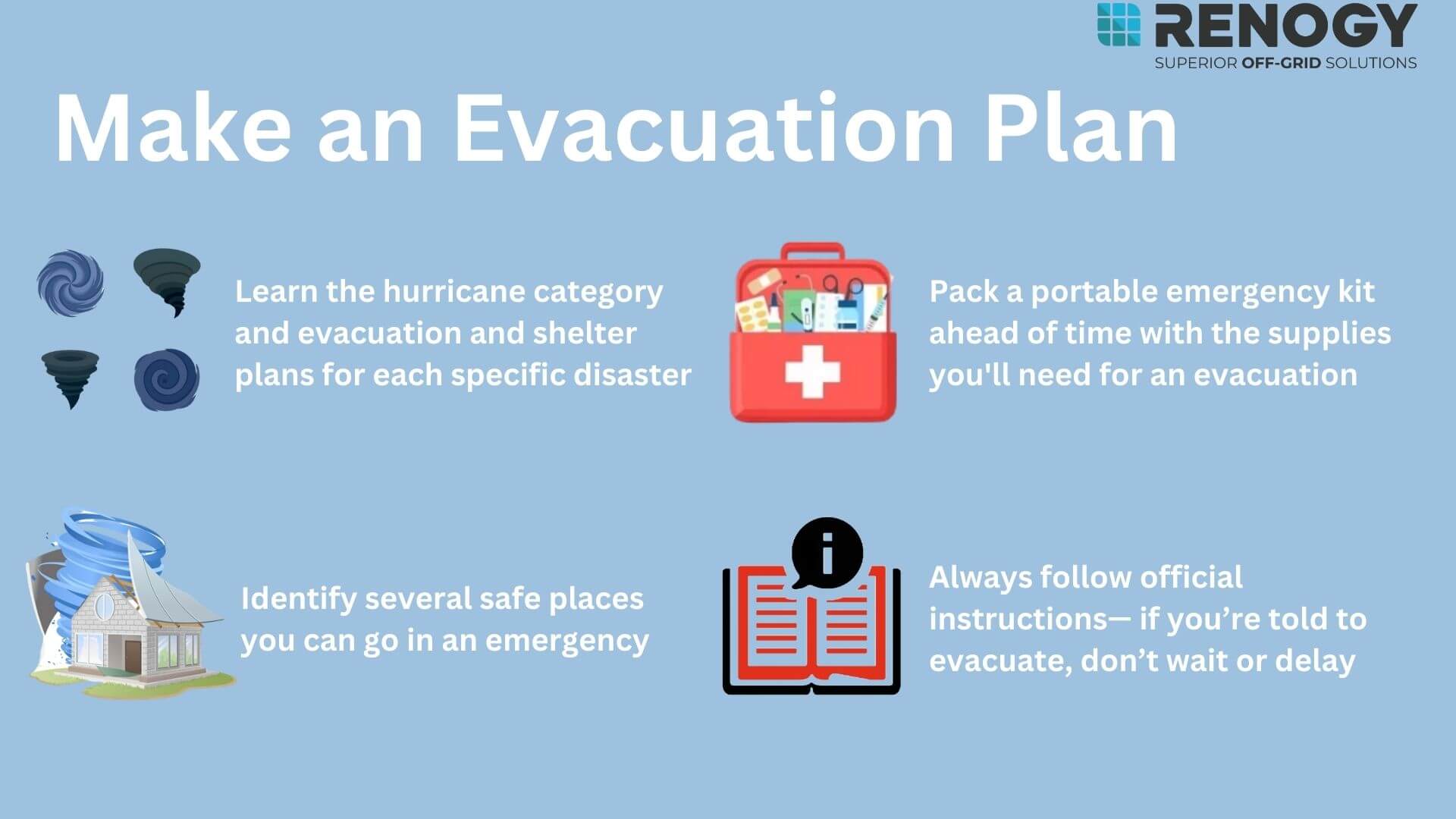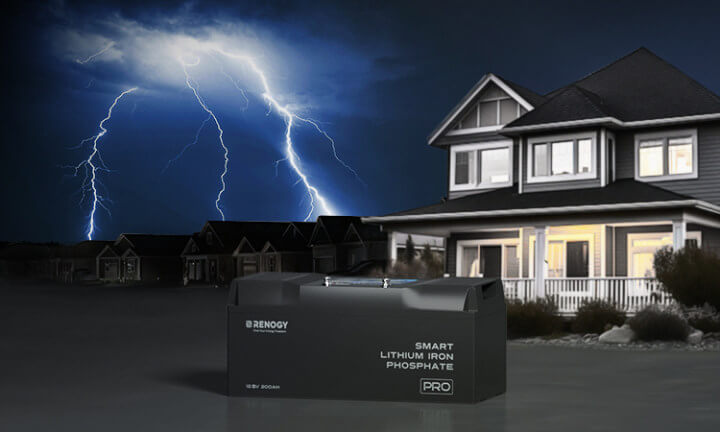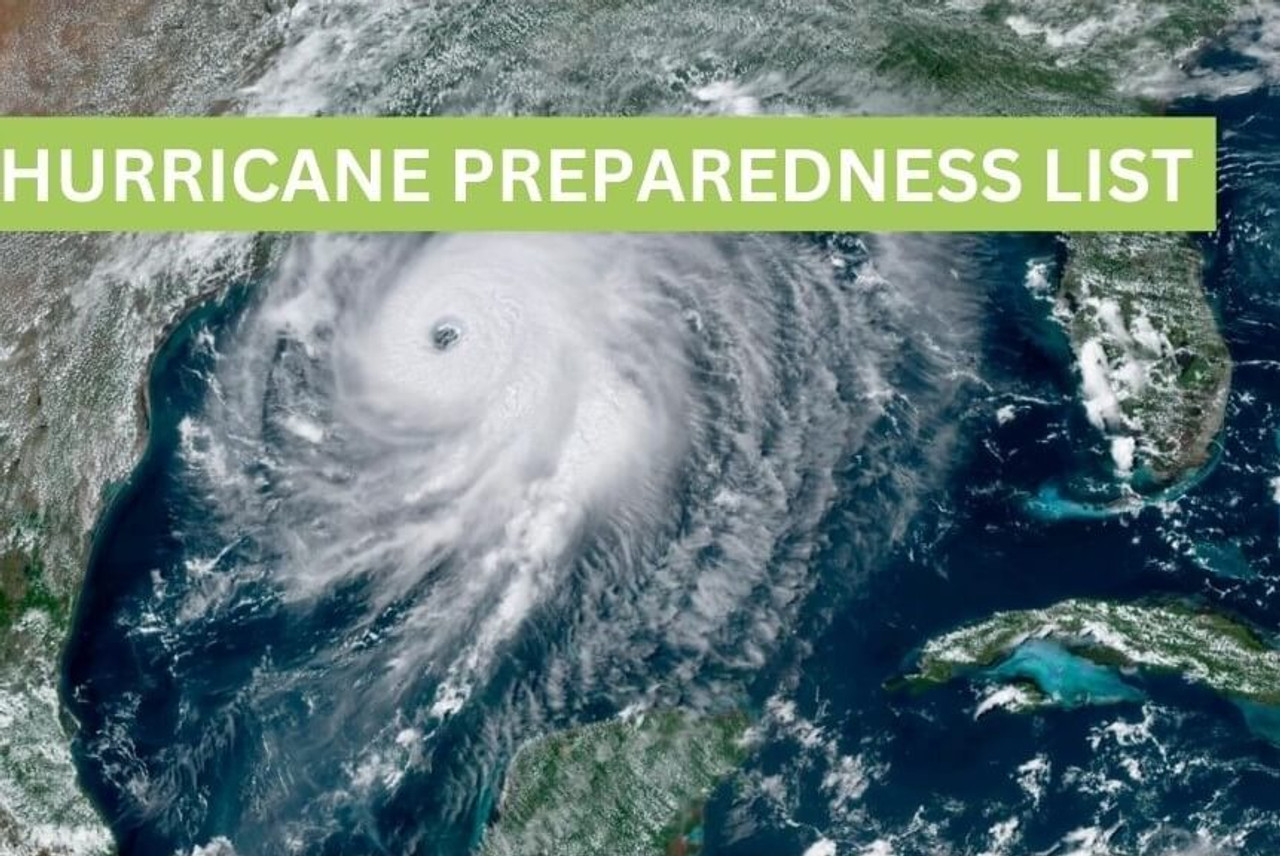Complete Guide to Hurricane Preparedness List
Hurricanes are intense tropical storms formed over warm oceans. They bring destructive winds, heavy rain, and storm surges causing significant damage to buildings and cause water, power, and gas outages. Therefore having a hurricane preparedness list can ensure you have all necessary supplies and plans in place, significantly reducing stress and uncertainty during a crisis. The list must include basic supplies like food and water, a first aid kit, clothing, flashlights etc., and emergency supplies like a first aid kit, medications, important documents, and emergency contact numbers.
Additionally, considering the high likelihood of power outages due to hurricanes, it's essential to include a backup power source like the Renogy 200Ah Pro Smart Lithium Iron Phosphate Battery in your list to prevent situations like loss of heat or the inability to cook, which could affect survival.
This guide will help you create a thorough hurricane preparedness list, addressing both general safety measures and specific considerations for solar energy systems.
Key Takeaways
- A hurricane preparedness list should include essential items like bottled water, any medications taken regularly, non-perishable food, battery powered radio, and vital documents – especially passports.
- Plan for possible evacuation, including mapping out routes to help you avoid dangerous areas and reach safe locations quickly
- Stay indoors and close doors and windows, learn the latest official news
- For solar owners, if you are an RV enthusiast, remove panels from your roof and move RVs to higher ground away from potential flood areas and trees. For fixed installations, ensure panels are securely fastened and consider additional reinforcement.
- The 2-in-1 12V 200Ah LiFePO4 battery with self-heating & BT
- Double active safety design for comprehensive safety
- Flame-retardant casing stops vertical burning from spreading in 10s
Latest News About Hurricanes
At Around 8:00 AM EDT 6th August, Hurricane Debby, the first of the Atlantic hurricane season 2024, is located 60 miles North-Northwest of Cedar Key and moving North-Northeastward at 10 MPH. Maximum sustained winds have decreased to near 80 MPH.
National Weather Service forecasters at the NOAA Climate Prediction Center predict above-normal hurricane activity in the Atlantic basin this year, with the potential for additional hazards such as tornadoes, flooding and hail. This year's hurricane season runs from June 1 to November 30. NOAA is forecasting a range of 17 to 25 total named storms (winds of 39 mph or higher). Of those, 8 to 13 are forecast to become hurricanes (winds of 74 mph or higher), including 4 to 7 major hurricanes (category 3, 4 or 5; with winds of 111 mph or higher).
Hurricane Preparedness List
Between 2000 and 2023, hurricanes caused an average of $21.5 billion in damage and 88 deaths per year. In 2017 alone, Hurricane Harvey resulted in $125 billion in damage, while Hurricane Maria claimed over 3,000 lives. These sobering statistics underscore the critical importance of stocking up on essential food, water, and supplies well before a storm threatens. Here is the Preparedness List including a collection of basic household items for an emergency.

Food and Water
During and after a hurricane, access to fresh food and clean water may be limited for days or even weeks. So keep a stock that lasts for at least two to three weeks. Food and Water to store during hurricane emergencies:
- Non-perishable food (7-day supply per person)
- 1 gallon of water per person per day (for at least 7 days)
- Manual can opener
- Disposable plates, cups, and utensils
- If you have children, you will also need to prepare additional baby food for them
First Aid Kit
During and after a hurricane, roads may be blocked, and medical facilities may be overwhelmed or inaccessible. Moreover, hurricanes often result in power outages and communication disruptions, making it difficult to seek help. A first aid kit provides the necessary supplies to manage health issues independently during these times. Here’s what you need to include:
- First aid kit and manual
- Bandages, gauze, and adhesive tape
- Antiseptic wipes and ointment
- Pain relievers and prescription medications
- Tweezers, scissors, and thermometer
- Disposable gloves and face masks
Hurricane General Supplies
Most times it's safer to stay indoors during a hurricane, and having general supplies ensures you can do so comfortably. Add these staffs to your hurricane preparedness list.
- Flashlights and extra batteries
- Battery-powered or hand-crank radio
- Whistle to signal for help
- Plastic sheeting and duct tape for emergency repairs
- Multi-tool or basic tool kit
- Personal Hygiene Items(including hand sanitizer, toothbrushes and toothpaste)
- Cash(Banks and ATMs may not be available after a storm)
Clothing
Hurricanes are usually accompanied by extreme weather such as strong winds and heavy rains, and the temperature changes unpredictably throughout the day. It is very necessary to prepare windproof and cold-proof clothing in advance during hurricanes in case of emergency. Here’s what you must include:
- Complete change of clothing for each family member
- Sturdy shoes or boots(protection from nails and broken glass)
- Rain gear
- Blankets or sleeping bags
- Reflective Vest(Increases visibility in low-light conditions)
Important Numbers
Hurricanes often lead to power outages, which can disrupt internet and phone services. Having a written list of important numbers ensures you can still make crucial calls, even if your cell phone’s battery dies or you can’t access your digital contacts. Here’s a list of contacts you must have:
- Emergency Services: 911 (for all immediate emergencies:medical, fire, police)
- Utility Companies: Gas, electricity, and water providers
- Local evacuation centers and shelters
- Contact information for family and friends
Important Documents
Detailed records of assets, home inventories, and personal identification help streamline the recovery and rebuilding process. For example, records of your home's condition before and after a storm can expedite the insurance process. Additionally, important documents are essential for verifying your identity and accessing financial resources, making them indispensable in the aftermath of a disaster.
- Copies of ID, birth certificates, and passports
- Insurance policies
- Medical records and prescriptions
- Bank account information
- Property deeds or lease agreements
Pet Care Items
Pets need a safe, comfortable space just like people do. Not all shelters or evacuation centers accept pets, so knowing your options and preparing in advance can make a big difference. Here’s what you must pack:
- Pet food and water (5-day supply)
- Leashes, harnesses, and carriers
- Pet medications and medical records
- Litter and litter box for cats
- Pet first-aid kit
Emergency Supplies For The Elderly
Older adults are more vulnerable to hardship and harm during a hurricane compared to younger people. They often deal with issues like limited mobility, social isolation, and trouble accessing medical care. By preparing emergency supplies for them in advance, we can help ensure they feel safe and comfortable during the storm, which can significantly ease their worries. Here’s what you should pack:
- Water and food
- Extra clothing, blankets, and comfortable footwear
- Spare eyeglasses, batteries, glucose meters, oxygen tanks etc.
- Cell phone with extra batteries and charger
- Prescription medicines
- A comprehensive first aid kit with bandages, antiseptics, and other basic medical supplies.
- Emergency Contact
Additionally, make sure to keep the items in separate bags and label them properly. Many elders have weak vision, and this way, they can access the required items during emergencies.
Make an Evacuation Plan
Develop a family hurricane preparedness evacuation plan before a storm threatens your area. It can save valuable time and, most importantly, lives.

- Learn the types of disasters that are likely in your community and the local emergency, evacuation and shelter plans for each specific disaster.
- Identify several safe places you can go in an emergency, like your friend’s house or a motel. Find out where the nearest open shelter is, just in case your other options aren't available during an evacuation.
- Make a family plan to stay in touch if you get separated, including a meeting place that you can update as needed.
- Pack a portable emergency kit ahead of time with the supplies you'll need for an evacuation. If you plan to evacuate by car, make sure your gas tank is full and ready to go.
- Always follow official instructions—if you’re told to evacuate, don’t wait or delay.
Hurricane Safety Tips
When it comes to the Atlantic hurricane season, learning how to prepare for a hurricane can make all the difference. It can keep your family and property safe and minimizes the hassle after the storm has passed.
Get ready for a power outage
Make sure your smoke and carbon monoxide detectors are working and have fresh batteries. Charge your cell phones and other electronic devices, and set your refrigerator and freezer to their coldest settings.
Store enough water
Fill a bathtub or other containers with enough water for bathing or flushing the toilet to keep personal hygiene during a hurricane.
Close windows and stay indoors
A hurricane can bring strong winds and heavy rain, so stay inside as much as possible. Cover all windows. If you don't have storm shutters, use 5/8-inch exterior-grade or marine plywood to seal the windows. Avoid using tape—it won’t protect the windows and will just make cleanup harder.
Stay informed
Keep an eye on local TV or radio for updates, as conditions can change quickly. If officials recommend evacuating, do so right away.
Prevent your home from flooding
After a hurricane, there is usually heavy rain and flooding. Prevent water from entering your home by raising items in the basement and checking your sump pump. Also, unplug low-lying electrical outlets to prevent electrical leaks.
Post-Hurricane Tips
Don't let your guard down after a hurricane because many dangers can arise now. These risks include contaminated water sources, damaged and unstable buildings at risk of collapse and broken gas lines or electrical systems causing an increased likelihood of fires. Follow these safety tips to keep your life and property safe.
- Keep listening to NOAA Weather Radio or local news for the latest updates.
- If you evacuated, only return home once officials have confirmed it’s safe.
- Carefully inspect the area around your home for loose power lines, gas leaks, and structural damage.
- Avoid entering any building if you smell gas, if there’s still floodwater around it, if it was damaged by fire, or if it hasn’t been cleared by authorities.
- Use battery-powered flashlights instead of candles. Turn on the flashlight before entering any building, as the battery could produce a spark that might ignite any leaking gas.
How to Prevent Hurricane Damage to Your Solar Panels
In hurricane-prone regions, solar installations must adhere to strict building codes. Modern systems installed to these standards can often withstand even Category 4 or 5 hurricanes with minimal damage. However, older installations or those not properly inspected are far more vulnerable. These outdated systems risk significant damage from hurricane-force winds and flooding, potentially compromising their entire functionality. Therefore, for solar homeowners, having a preparedness list or knowing what to do before and after a hurricane is crucial.
Here are steps to help you prevent hurricane damage to your solar panels and keep them up and running even after the worst storms hit.
What to Do Before the Storm
Check Mounts and Racking: Ensure that all mounts and racking systems are secure and in good condition.
Clean Panels: Remove any debris or dirt from the panels.
Battery Backup: Ensure that your solar battery storage is fully charged to provide power during outages.

Inspect Drainage Ditches and Gutters: Keep gutters and drains clear to prevent water from seeping into your solar equipment.
Take Photos: Document the condition of your solar panels and equipment for insurance purposes and potential claims.
If you are traveling in an RV with a solar system during a hurricane, you should remove portable solar panels (if they are roof-mounted panels, make sure they are securely fastened) and store panels indoors or in a safe place.
Stow or tie down any loose wires, connectors or accessories. If possible, move the RV to a sheltered area or a sturdy structure.
Remember, personal safety always comes first. If local authorities recommend evacuating, prioritize evacuation over protecting your RV solar system.
What to Do after the storm
After a hurricane, solar homeowners need to take careful steps to ensure safety and assess potential damage. Here's what to do.
First, wait for official clearance before inspecting your property. Once safe, visually check your solar installation from the ground for any obvious damage to panels, mounting, or wiring but don't touch anything, as there could be electrical hazards.
Document any damage with photos for insurance purposes. Then, contact your solar installer for a professional assessment. Don't reactivate your system until it's been cleared by an expert.
- Portable at 13.7kg: compact, foldable, and lightweight
- Superior fiberglass material for decades of reliability
- 1-minute setup with IP68 solar connectors and aluminum kickstands
Conclusion
Taking the time to carefully prepare your hurricane preparedness list, you're not just ticking boxes – you're building resilience and peace of mind. Remember, your hurricane emergency list should be a living document. Review and update it regularly, especially at the start of each hurricane season. As you've seen throughout this guide, being prepared encompasses more than just gathering supplies. It involves understanding evacuation routes, securing your property, and staying informed.
FAQs
1. What are the most essential items for a hurricane emergency kit?
The most crucial items include:
- At least a 7-day supply of non-perishable food and water (1 gallon per person per day)
- First aid kit and prescription medications
- Flashlights and extra batteries
2. Should I evacuate, and if so, when?
Whether to evacuate depends on your location and the hurricane's severity. Always follow official evacuation orders. If you live in a coastal or low-lying area, mobile home, or high-rise building, you may be asked to evacuate earlier.
3. How do I prepare my house for a hurricane?
To protect your house from a hurricane, secure loose items in your yard or bring them inside, Install storm shutters or use plywood to cover windows and clean gutters and downspouts to prevent water damage.











